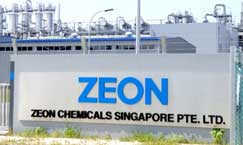Japan’s Zeon Corporation has announced plans to increase production of high-grade solution-polymerised styrene-butadiene rubber (S-SBR), a key material for fuel-efficient tyres, by upgrading facilities at its Singapore plant (Zeon Chemicals Singapore Pte Ltd). It adds that this enhancement reinforces its dual-site S-SBR supply system, complementing its existing production at the Tokuyama Plant in Shunan City, Japan.
The newly upgraded facility in Singapore has completed installation and will enter test production ahead of full-scale commercialisation in 2026.
Once operational, Zeon’s combined annual S-SBR production capacity across both plants will reach 125,000 tonnes, with an increased focus on high-grade products that enhance tyre performance, improving wet grip, rolling resistance and abrasion resistance. This move aligns with Zeon’s goal to solidify its position as the global leader in high-performance S-SBR.
Zeon has been a pioneer in S-SBR since 1986, when it began production at its Tokuyama Plant, followed by the Singapore facility in 2013. S-SBR’s precisely controlled molecular structure not only boosts automotive fuel efficiency but also reduces microplastic pollution by minimising tyre wear dust, a critical factor in combating air pollution.
Recognising these benefits, Zeon has certified S-SBR as a Sustainable Development Goals (SDGs) Contribution Product and continues to advance its development and global adoption.
Meanwhile, in Japan, Zeon has set up a new research facility at its Yonezawa site to develop plant-based production processes for synthetic rubber raw materials as it accelerates efforts to decarbonise its operations and support a circular economy.
The new lab will focus on advancing biofermentation and chemical reaction technologies to produce butadiene and isoprene, key building blocks for synthetic rubber, directly from plant-derived feedstocks.
The initiative is part of Zeon’s “STAGE30” medium-term business plan, which includes a target to cut group-wide carbon dioxide emissions by 42% by fiscal 2030 from 2020 levels.
The research centre, completed in May, spans 590 sq m and features laboratories with local exhaust ventilation alongside office and meeting spaces.
The project is also supported by Japan’s Green Innovation Fund, run by the New Energy and Industrial Technology Development Organisation (NEDO), which backs long-term industrial decarbonisation initiatives.
Zeon is collaborating with Yokohama Rubber Co and several academic institutions on two key development themes, including the use of plant-based and sustainable materials for producing rubber intermediates.
Zeon said it aims to commercialise the technology for producing butadiene and isoprene from plant sources by 2034.

